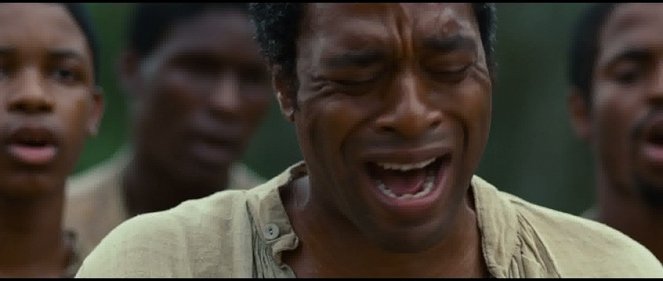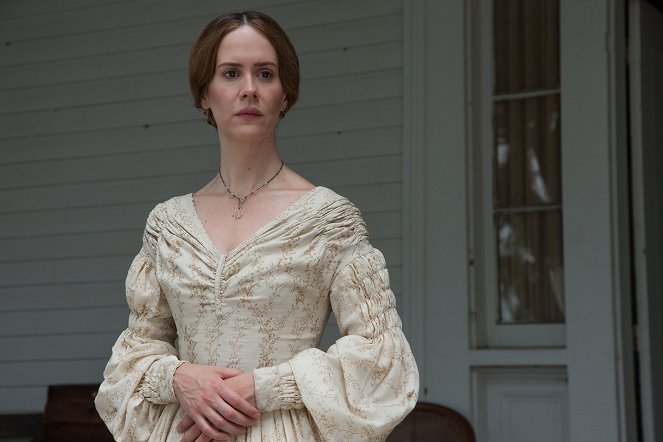Directed by:
Steve McQueenScreenplay:
John RidleyCinematography:
Sean BobbittComposer:
Hans ZimmerCast:
Chiwetel Ejiofor, Michael Fassbender, Lupita Nyong'o, Benedict Cumberbatch, Sarah Paulson, Paul Dano, Brad Pitt, Paul Giamatti, Michael Kenneth Williams (more)VOD (1)
Plots(1)
12 Years a Slave tells the incredible true story of one man's fight for survival and freedom. In the pre-Civil War United States, Solomon Northup (Chiwetel Ejiofor), a free black man, is abducted and sold into slavery. Facing cruelty from a malevolent slave owner (Michael Fassbender), Solomon struggles not only to stay alive, but to retain his dignity in his quest to be reunited with his family. (Icon Home Entertainment)
(more)Videos (36)
Reviews (16)
I was afraid of self-poignant historical frescoes about a cohesive black community and ugly southern slaveholders, but I got a surprisingly bright and complex story of a man who will perhaps too quickly acquire a forced identity and live his 12 years not in chains, but in separation (from his family, but also from the "community" of Negro slaves). Like Tarantino a year ago, McQueen ticks off too-simple boxes and pleasing catharsis. Although the screenplay sometimes casts unnecessarily large words under his feet, but the narrative through images, the emphasis on ambiguous "looking" into the face of the protagonist and his companions, and the inner stratification of individual Lords keep him close to his central theme - lack of freedom, which is not the result of specific enslavement, but rather existence itself. In the end, we can come to the surprising discovery that more than anything, 12 Years a Slave is a film about the acceptance of someone else's identity and the traumatic loss of oneself. Hence the often mentioned passivity of the main character, which is in fact an essential part of his choice to survive even through the greatest compromises. More like Frantz Fanon than Steven Spielberg, the film is masterful and strong in the best moments, despite its imbalance. In the others, perhaps safely approaching conventions, it is still at least fascinating and worth thinking about. [85%]
()
I took the time to read a little more about the whole Solomon Northup thing. Right up to the moment when he is freed from slavery, it is a wonderful account of the American South before the Civil War. But why does the film end here? Because what happened later and how much information there is about it would not be as clear. It is no coincidence, after all, that the memoirs helped Northup write and publish it just a year after "Uncle Tom's Cabin" was published. None of those involved in his abduction were punished. Northup himself disappears very soon after a brief tour to promote his cause and book. Given the kind of manifesto the film version of 12 Years a Slave was meant to be, it raises more questions, and it's not just about the pious parallel with today. Why all the acting orgies by Fassbender, Paulson, or Pitt? Nyong'o is only acting in the MCU these days anyway, so I'm not really feeling all that good about it.
()
Just like Zimmer recycles his music, McQueen here has recycled all of the movies about black slaves that have existed to this day. Honestly, this film has nothing unexpected or otherwise interesting. Ejiofor becomes a slave, is a slave for twelve years and then it’s no longer a slave. The end. I also had some problem with the time frame, it didn’t feel at all like it was twelve years, I actually felt that the story could’ve taken place in four years, or even less. But the execution is very good, without any excessive moralising or pathetic bullshit, so a pretty decent Oscar winner. BTW, the best performance is Fassbender’s, hands down, while Pitt surprisingly manages to annoy even in his short, almost cameo appearance.
()
This was supposed to be a magnum opus with everything, but instead there came false grandiosity, where the plot only describes larger or smaller circles. I'm somewhat regretful given Steve McQueen's obvious engagement, but neither the raw scenes nor Michael Fassbender's dominating performance help him on his way to the audience this time. This is partly due to the fact that Hans Zimmer' music is overly sentimental and therefore incongruous, partly it is the feeling of futility that the casting gave forth excellent performances that go nowhere (Paul Giamatti, Benedict Cumberbatch). But worst of all – thematically, there is absolutely nothing extra. The sorrowful looking (and it must be said, significantly underplayed) Chiwetel Ejiofor is dragged by destiny, encounters slimy, treacherous, or weak white men, and sympathizes with suffering black people. And that, more or less, is where it ends. In fragments of the plot or dialogue, it occasionally functions, but as a whole, it is remarkably transparent.
()
Django turned upside down. An odyssey into the emotional and mental state that results from the loss of dignity and absolute humiliation, quietly conveyed in wide-angle shots of marshy Louisiana with music by Hans Zimmer that is reminiscent of his score for The Thin Red Line (Williams’s strings would have worked better here). The unimaginative but “safe” Hollywood narrative template keeps the film unnecessarily tame and moves it away from the original character we had hoped for from the film’s director, Steve McQueen. He made a huge mistake by casting the likeable Fassbender in the key and most complex role of the sadistic, evil and weak Epps. Even Benedict Cumberbatch would have been a better fit for this paraphrase of the character of Amon Goeth (Ralph Fiennes) from Schindler’s List and, with a more believable embodiment of ultimate human evil, the last third of the film escalating in the final flogging could have been the most powerful movie moment of the year.
()



Ads